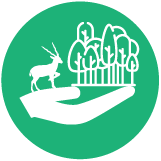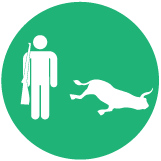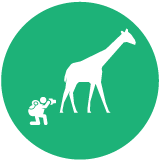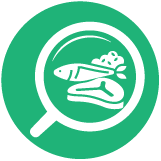Legal Hub/Suriname
LEGAL HUB/SURINAME

BACKGROUND
Country legal hubs are a user-friendly point of access to a comprehensive set of data and analysis on the statutory legal frameworks relating to sustainable wildlife management. This includes environmental protection, tenure rights, land use planning, the consumption (hunting and fishing) and non-consumption (ecotourism) use of wildlife, as well as animal production, animal health, and food safety and security.
Each legal hub provides:
- historical and political background on the country;
- access to relevant national normative texts by sector;
- legal assessment of sectoral legislation;
- overview of the domestication of international instruments;
- description of relevant national institutions and their roles.
NATIONAL PARTNER
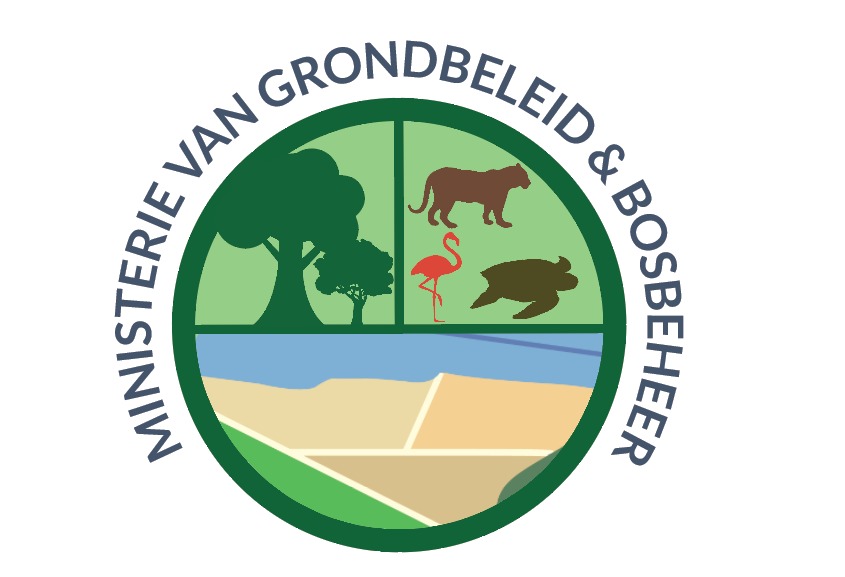

LEGAL AND POLITICAL CONTEXT

Political system: Republic; Presidential-parliamentary system
Administrative and territorial organization: Cabinet appointed and headed by President. Suriname is divided into 10 administrative districts (Brokopondo, Commewijne, Coronie, Marowijne, Nickerie, Para, Paramaribo, Saramacca, Sipaliwini, Wanica) at regional level and 62 resorts at local level.
Legal system: Civil law
International Conventions: Monist system. According to the Constitution, treaty provisions which may be directly binding on citizens shall become effective upon its promulgation. In the case where the international treaties provide for instruction norms towards the Government, they must be transformed into national legislation to be applicable.
Suriname (previously Dutch Guiana), officially the Republic of Suriname, was a former British (1651-1667) then Dutch colony (1665-1975), and acceded to independence in 1975. While military coups and a civil war followed independence, a peace treaty was signed in 1992 with a return to civilian rule. Suriname currently is a unitary state.
The Republic of Suriname is a constitutional democracy based on the 1987 (amended in 1992) constitution. The legislative branch of government consists of a 51-member unicameral National Assembly, simultaneously and popularly elected for a 5-year term. The country is divided into 10 districts governed by locally elected District Councils, presided over by District Commissioners appointed by the President. Legislation also provides them with specific administrative powers, for example, under the Game Act, the District Commissioner has the power to issue hunting/special licences
The President of Suriname is the Head of State, the Head of Government, the Chairman of the Council of State and of the Security Council. Executive power is exercised by the government which consists of the President, the Vice-President and the Council of Ministers. The President is advised by the Council of State in the execution of his office.
Legislative power is vested in both the government and the National Assembly which is the highest institution of the State to which the president answers. As for legislative powers at district level, the District Council is responsible for the provision of regulations of the district, and subject to the provision of the law, and has the power to draft district ordinances for specific matters.
The High Court of Justice is the highest court of law in Suriname and is the head of the judicial branch. There are also three Cantonal Courts which have their seat in Paramaribo. Whilst the High Court of Justice is the highest court of appeal, cases beyond the court can be referred on to the Caribbean Court of Justice
Suriname is a civil law jurisdiction. Its laws are derived from Dutch Civil law given the country’s historical past. The Suriname Civil Code reflects the Old Dutch Civil Code of 1838. Historically, the southern part of Suriname would see the application of customary laws of indigenous populations and the Maroons. However, the indigenous communities and the Maroons hold no special status under national law. The law does not protect the demarcation of their lands and their rights over such lands and natural resources either. Sectoral laws make only very brief reference to ‘the rights of Indigenous and tribal people’, and there are no further provisions or specifications on what these rights exactly are and how they can be enforced.
LEGAL FRAMEWORK
This section provides access to a list of statutory instruments specific to each sector that can be consulted and downloaded.
STATUTORY LAW
Detailed legal diagnostics are available on national statutory instruments regulating the following topics
DOMESTICATION OF RATIFIED INTERNATIONAL INSTRUMENTS
Convention on International Trade in Endangered Species of Wild Fauna and Flora (CITES)
See moreDate: 17 November 1981
INSTITUTIONAL SET‐UP
Institutions |
Roles |
|---|---|
|
National Environmental Authority.
|
|
|
National Institute for Food Safety Suriname (NIVS)
|
|
|
Fish Inspection Institute
|
|
|
Veterinary Service
|
|
|
Nature Conservation Commission
|
|
|
Suriname Forest Service
|
|
|
Nature Conservation Division
|
|

